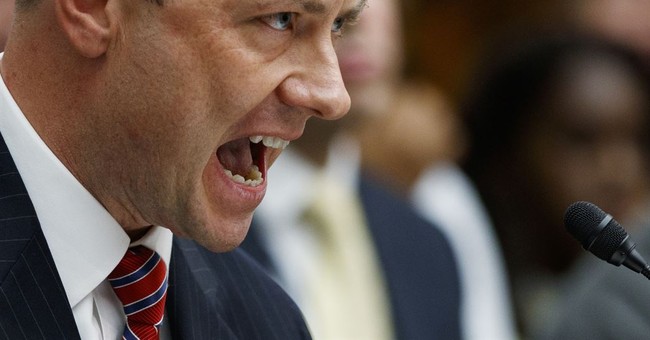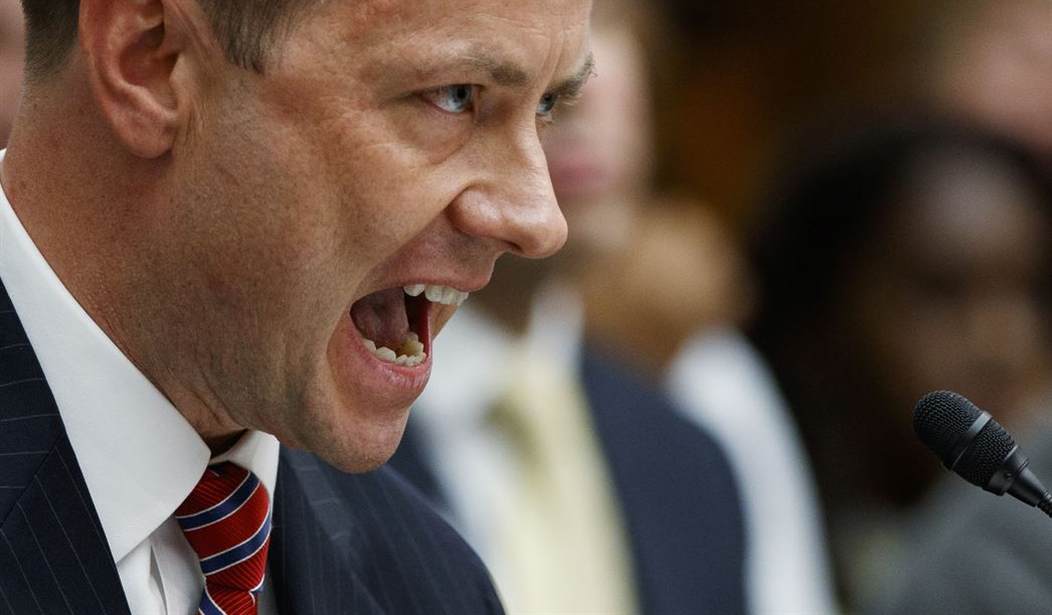
Today, Lindsey Graham released some new documents which highlight a few things that many of us have said from the earliest days of the Russia Hoax.’
First, major US media, in particular The New York Times and the Washington Post, used sources they either knew or should have known to be unreliable in reporting on the alleged collusion between the campaign of President Trump and any agent or agency of the Russian government. They did this either out of a partisan desire to damage the Trump presidency or out of callous disregard for basic decency. Either explanation is defensible, but, as a would-be astronaut once famously said, “What difference, at this point, does it make?”
Second, the FBI, and by extension, the Department of Justice run by Jeff Sessions and Rod Rosenstein, knew that the Steele dossier that served as the ‘Q source’ for the entire industry that grew up around the Russia Hoax was a fraud from a very early date and yet they continued to use that dossier to justify a FISA warrant on Carter Page.
The last point is that the FBI clearly knew long before James Comey, former FBI director and erstwhile professor of ‘ethical leadership’ ( I’m not making that up), was defenestrated that the entire premise of the Russia Hoax that fueled the appointment of a special counsel and sent a barely animated Robert Mueller and a posse of Democrat activist assclowns stumbling across America, indicting both the innocent and the imaginary. (READ: How Did Robert Mueller Manage to Indict an Imaginary Defendant?.)
First, the dossier.
In January 2017, as the Trump administration, the FBI conducted a three-day interview with someone referred to the ‘primary sub-source’ for the Steele dossier. If you’re late to the game, Steele didn’t actually interview anyone. Rather he relied upon a network of ‘sub-sources’ to gather rumors for him to tart up in officialese and sell to the Clinton campaign. The whole process of how the dossier was assembled has always struck me as something that was bound to produce a product that was inaccurate or deliberately misleading. Steele was unable to travel to Russia because of his MI-6 employment. He was unable to ask questions or render judgment on the veracity of sources. Instead, he had to rely on paid stringers to find sources, and we can assume that if you didn’t produce information that you didn’t’ get paid. Plus, what is the over/under in how long it took the FSB to find out that people were asking questions about the actions of a US presidential candidate during an election?
The Steele Memo Is Much More Likely Russian Dezinformatsiya Than It is Intelligence
Here’s Why We Should Be Hoping That the Steele Dossier Was Written By the Russians
Key Russian Sources for the Steele Dossier Are Identified and They Will Blow Your Mind
FBI Knew Russian Intelligence Was Monitoring and Probably Influencing Christopher Steele’s Dossier and Still Used It
This is a summarized transcript of the debriefing but there are some major issues:
- This document not only demonstrates how unsubstantiated and unreliable the Steele dossier was, it shows that the FBI was on notice of the dossier’s credibility problems and sought two more FISA application renewals after gaining this awareness.
- The document reveals that the primary “source” of Steele’s election reporting was not some well-connected current or former Russian official, but a non-Russian based contract employee of Christopher Steele’s firm. Moreover, it demonstrates that the information that Steele’s primary source provided him was second and third-hand information and rumor at best.
- Critically, the document shows that Steele’s “Primary Sub-source” disagreed with and was surprised by how information he gave Steele was then conveyed by Steele in the Steele dossier. For instance, the “Primary Sub-source”: did not recall or did not know where some of the information attributed to him or his sources came from; was never told about or never mentioned to Steele certain information attributed to him or his sources; he said that Steele re-characterized some of the information to make it more substantiated and less attenuated than it really was; that he would have described his sources differently; and, that Steele implied direct access to information where the access to information was indirect.
- In total, this document demonstrates that information from the Steele dossier, which “played a central and essential role” in the FISA warrants on Carter Page, should never have been presented to the FISA court.
Next up is the FBI, in the person of no less Peter Strzok, being aghast at the malicious reporting by The New York Times. The story in question is Trump Campaign Aides Had Repeated Contacts With Russian Intelligence by Michael Schmidt, Mark Mazzetti, and Matt Apuzzo. The byline is important because Schmidt basically served as a conduit for FBI information throughout the Russia Hoax.
Here are some of the paragraphs with Strzok’s annotations beside them.
Phone records and intercepted calls show that members of Donald J. Trump’s 2016 presidential campaign and other Trump associates had repeated contacts with senior Russian intelligence officials in the year before the election, according to four current and former American officials.
American law enforcement and intelligence agencies intercepted the communications around the same time they were discovering evidence that Russia was trying to disrupt the presidential election by hacking into the Democratic National Committee, three of the officials said. The intelligence agencies then sought to learn whether the Trump campaign was colluding with the Russians on the hacking or other efforts to influence the election.
New docs – 2/2017 Peter Strzok notes on NYT Trump/Russia reporting.
NYT claimed that Trump campaign had repeated contacts w/ senior Russian intelligence officials before election.
Strzok: "misleading and inaccurate… no evidence [of this]."
Full doc:https://t.co/jDwV9HuNuM pic.twitter.com/8cIHeiQU5D
— Techno Fog (@Techno_Fog) July 17, 2020
The officials said that one of the advisers picked up on the calls was Paul Manafort, who was Mr. Trump’s campaign chairman for several months last year and had worked as a political consultant in Ukraine. The officials declined to identify the other Trump associates on the calls.
The call logs and intercepted communications are part of a larger trove of information that the F.B.I. is sifting through as it investigates the links between Mr. Trump’s associates and the Russian government, as well as the hacking of the D.N.C., according to federal law enforcement officials. As part of its inquiry, the F.B.I. has obtained banking and travel records and conducted interviews, the officials said.
…
The officials would not disclose many details, including what was discussed on the calls, the identity of the Russian intelligence officials who participated, and how many of Mr. Trump’s advisers were talking to the Russians. It is also unclear whether the conversations had anything to do with Mr. Trump himself.
Senate Judiciary Committee releases more Trump-Russia documents. Here, FBI's Strzok annotates big 2/14/17 New York Times scoop, 'Trump Campaign Aides Had Repeated Contacts With Russian Intelligence.' The story was wrong in almost every respect. https://t.co/9ljKilaUge pic.twitter.com/Skz0ACXjkM
— Byron York (@ByronYork) July 17, 2020
The F.B.I. has closely examined at least three other people close to Mr. Trump, although it is unclear if their calls were intercepted. They are Carter Page, a businessman and former foreign policy adviser to the campaign; Roger Stone, a longtime Republican operative; and Mr. Flynn.
NYT: Roger Stone was part of the FBI's inquiry into Russian ties.
FBI: "We have not investigated Roger Stone" pic.twitter.com/9Gtotx6bWV
— Techno Fog (@Techno_Fog) July 17, 2020
These are some other items Graham brings up:
This is how Graham’s committee staff sums it up:
- The document demonstrates that Peter Strzok and others in FBI leadership positions must have been aware of the issues with the Steele dossier that the FBI’s interview with Steele’s “Primary Sub-source” revealed, because Strzok commented that “[r]ecent interviews and investigation, however, reveal Steele may not be in a position to judge the reliability of his sub-source network.”
- The document further shows that the FBI’s assertion to the FISA court that “the FBI believes that Russia’s efforts to influence U.S. policy were likely being coordinated between the RIS [Russian Intelligence Services] and Page, and possibly others” appears to be a misrepresentation. This is because, in his comments on the Times article, Strzok asserts that “[w]e have not seen evidence of any individuals affiliated with the Trump team in contact with IOs [Intelligence Officials]. . . . We are unaware of ANY Trump advisors engaging in conversations with Russian intelligence officials.”
- The document also indicates that the FBI may have been using foreign intelligence gathering techniques to impermissibly unmask and analyze existing and future intelligence collection regarding U.S. persons associated with the Trump campaign: “Both the CIA and NSA are aware of our subjects and throughout the summer we provided them names and selectors for queries of their holdings as well as prospective collection.” The quote does not provide enough information to fully understand exactly what the FBI was doing but impermissible unmasking and analysis of existing and future incidental intelligence collection of U.S. persons would be troubling.
- The document also raises questions as to whether the FBI was properly using intelligence techniques and databases “throughout the summer” considering that the earliest formal investigation of a U.S. person associated with the Trump campaign was not officially opened until July 31, 2016.
So, no later than February 14, 2017, the FBI knew the information in the Steele Dossier was bogus and they knew that there were no ties linking anyone on the Trump campaign to Russia. And yet, as someone said, they persisted. They also knew that someone inside the FBI was feeding bogus information to The New York Times and yet took no steps to correct what they knew to be false information being pumped into a very poisonous political debate. In fact, the FBI had enough information to shut down the Russia Hoax before it got started.
The unanswered question is who in the FBI would be feeding The New York Times information that was so wrong that even a Trump-hater like Strzok was appalled.













Join the conversation as a VIP Member